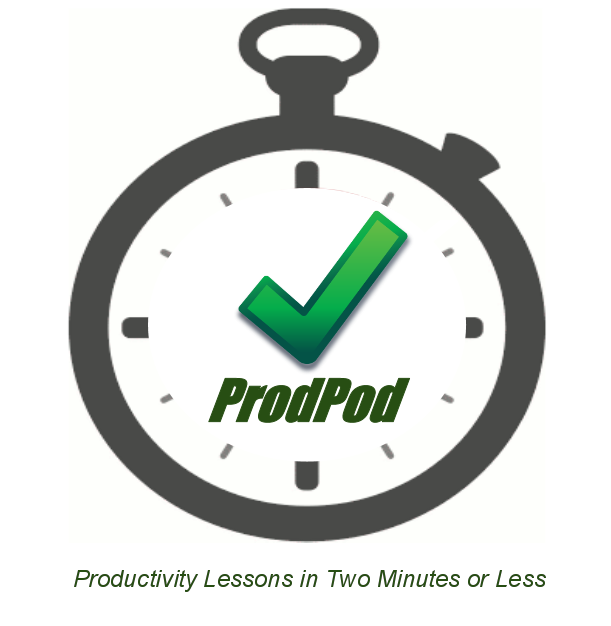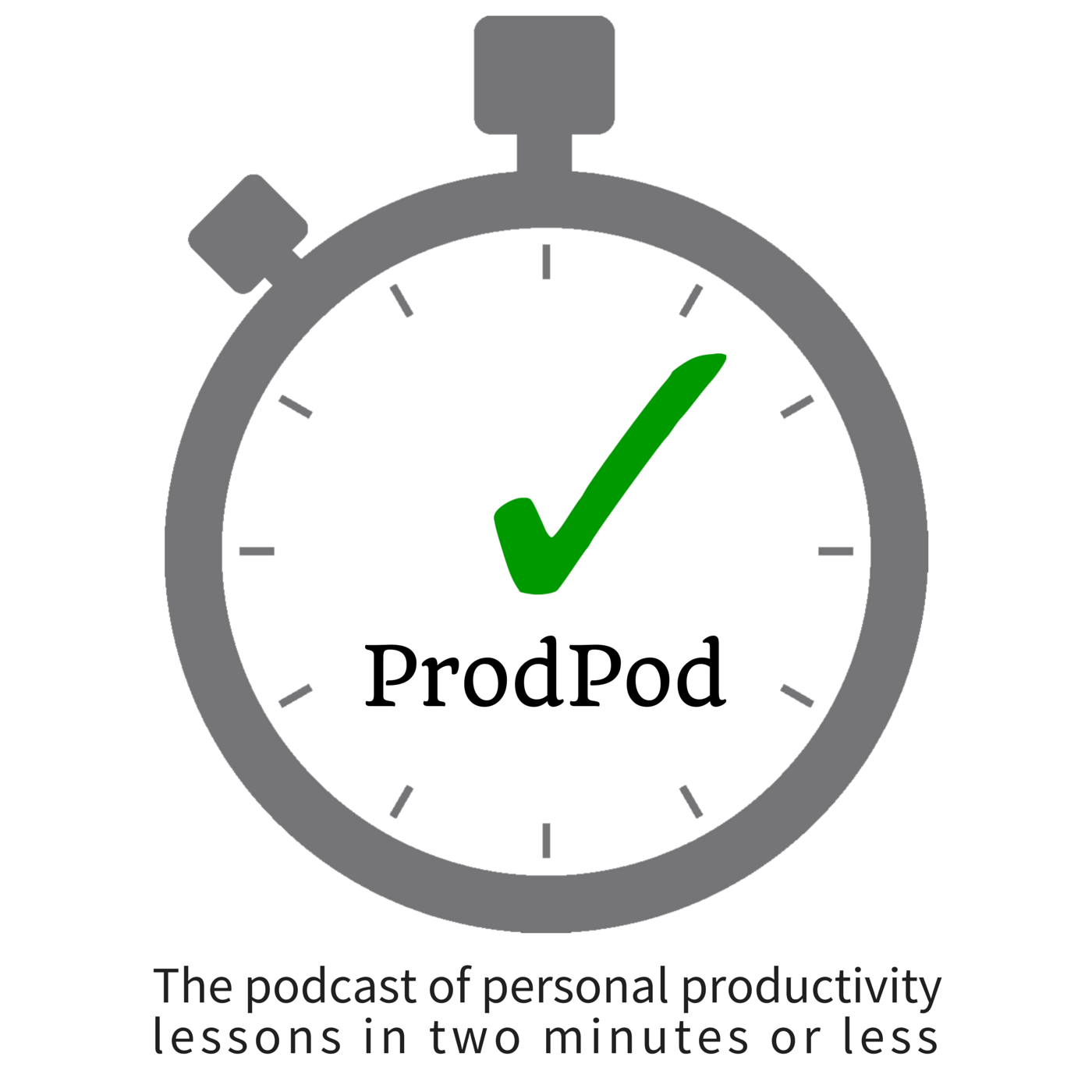Episodes

Thursday Aug 18, 2011
ProdPod: Episode 13 -- How to Form a Productive Habit, Part 2
Thursday Aug 18, 2011
Thursday Aug 18, 2011
Stop Digging: Unproductive Habits This is part two of our 4-part podcast on How to Form a Productive Habit. In this episode, we'll be discussing Unproductive Habits.
This is part two of our 4-part podcast on How to Form a Productive Habit. In this episode, we'll be discussing Unproductive Habits.
Most productive habits start by the realization of an unproductive one. So, my first piece of advice is to stop digging as best you can. If your clothing caught on fire, you shouldn't run as the fire will spread. The best thing to do is to stop, drop and roll, to cut off the oxygen vital to the fire. Much of your behaviors that built your unproductive habits were noticeable when you first formed them. Combat the unproductive habit by taking the time to reflect on it before replacing the unproductive habit with your newly-formed productive habit.
Next, ask yourself: What was the original purpose or reason for the development of this unproductive habit? What need/want did it fulfill? And what is the new necessity or desire you want to achieve? Write this down. Put it in a drawer and come back to it as often as necessary.
Negate as much negative self-speak and internal dialog. I also suggest not talking about habits as "good" or "bad" as it connotes judgment more than if something is quantitatively or qualitatively productive or not. And one final guideline: Avoid using the present or past tense of the modal auxiliary verbs: will, should, would, could, can, must, ought to, had better, dare and need. I find that people who keep their self-speak in the present indicative mood (I am a productive person. INSTEAD OF I will be a productive person.) tend to shed bad habits faster and long-term.

Tuesday Aug 16, 2011
ProdPod: Episode 12 -- How to Form a Productive Habit, Part 1
Tuesday Aug 16, 2011
Tuesday Aug 16, 2011
Distinguishing Between Habits and Other Forms of Non-Associative Learning In this 4-part podcast, I'll be discussing How to Form a Productive Habit. In this first episode, I'll explain the groundwork for determining how you'll tackle the formation of a new habit.
In this 4-part podcast, I'll be discussing how to Form a Productive Habit. In this first episode, I'll explain the groundwork for determining how you'll tackle the formation of a new habit. So, let's get right to it.
To make sure we're all speaking using the same understanding of terms, I'm going to define a few key items: habit, automaticity, habituation and sensitization. Then, I'll explain their relationship to forming productive habits.
A habit is an automatic response pattern developed by repeating a behavior until it becomes almost or completely unconscious.
Automaticity in psychological terms has been described as "unconscious competence" or the ability to do things without occupying the mind with the low-level details required, allowing them to become a habit. Some examples include driving a car, riding a bicycle, music sight-reading while playing the piano, and even speaking.
Habituation is the non-associative learning, psychological process, where a person decreases response to a stimulus after repeated exposure. A good example is your clothing. Once dressed, you feel your clothes on your skin but within minutes you no longer actually sense the clothing as your mind attends to more important stimuli.
Sensitization is another form of non-associative learning where a person responds because of a progressively increasing level of stimulus. Try rubbing your arm progressively faster until it burns; your response is to pull away because your brain initiates a pain response.
It's best to determine when you are forming a habit, whether you need to concern yourself with habituation or sensitization. For example, forming the productive habit of washing the dishes daily may be one part forming the habit and the other part realizing that something in your youth triggered a fear of dishwashing liquid. You'll need to habituate to the dishwashing liquid touching you before you'll ever be able to form the productive habit. And, you may even have a spouse or roommate remind you (with your permission) to perform the habit-in-process until you do it, so that with each reminder, your brain eventually initiates a crescendo-like response to your own commitment to wash the dishes.

Thursday Aug 11, 2011
ProdPod: Episode 11 -- Power Productivity Through Active Listening
Thursday Aug 11, 2011
Thursday Aug 11, 2011
This episode is a series of quick tips I've gathered over time for power productivity through active listening.
We have so many forms of communication available to us today. Technology keeps improving and with a globally-connected, 24/7 society, you could easily have engaging conversations 'round the clock. With all this capacity and experience with digital communication technologies, it makes sense that some of our interpersonal skills will change or need refreshing, like active listening. This episode is a series of quick tips I've gathered over time for power productivity through active listening.
1. Ask more questions than giving declarative statements, then stop talking and listen to the answers being given. You'll be surprised how much you can accomplish when you let others do and say more.
3. Ask clarifying questions to let your speaker know you're listening and engaged.
4. When possible, make eye contact and pay attention to body language.
5. Repeat back what is said in your own words, so the speaker knows you listened and understood what was said. This is also an opportunity for her to clarify in case you haven't.
6. Once you have mastered the art of active listening. Teach it to others. Pay it forward. As the old adage goes, if you teach something you learn it twice, plus it will save you time and hassle in the future.
2. Hearing is a sense. Listening is an active process. Develop your skills for listening not just hearing.

Tuesday Aug 09, 2011
ProdPod: Episode Ten -- Meta-Tasking
Tuesday Aug 09, 2011
Tuesday Aug 09, 2011
In the last episode, I explained the benefits of single-tasking, or completing one task at a time, over multi-tasking. Well, in this episode's tip: I'd like to introduce a new kind of productivity technique I've coined "meta-tasking."
What if we can take the benefits of single-tasking--focus, greater creativity, more time to relax and less stress, and faster completion of tasks, and add the mythical promise of getting more done by multi-tasking?
First, break your day into locations and activities. For example, Home, Commute, Office, Gym, Commute, Home, and Bed are my basic times within which I control my work. Next, ask yourself what tasks daily, weekly, monthly, or any other repeating schedule, do I have to do things like meal preparation, laundry, cleaning, calling customer service or tech support with extended wait times, grocery shopping, etc. For each repeating errand, I can calculate conservatively from experience how much time they take. Finally, I look at my next-actions or projects list and find items that can be grouped together and done during these times when much of my activity requires waiting, for example, while the laundry and dryer are going, I can accomplish two to four 15-minute tasks.
When I'm planning my week ahead, I just review my calendar for these repeating errands and I can quickly and easily fill that time in with more productive tasks.
Remember, in order for meta-tasking to truly be beneficial is to prioritize tasks where shifting focus is minimal and gives you ample time to finish. Set yourself up for success by having small tasks grouped together. Satisfaction is the goal here, not just efficiency.

Thursday Aug 04, 2011
ProdPod: Episode Nine -- Single-Tasking
Thursday Aug 04, 2011
Thursday Aug 04, 2011
This episode's tip: Single-tasking is the way to achieve more with greater focus and less stress, not multi-tasking.
So, what are you doing when you're multi-tasking? You're actually quickly changing focus back and forth between each task. And just like a car, you cannot turn the vehicle in two directions concurrently. And every time you turn the vehicle, you must slow down, recalibrate the car's direction then return acceleration to your original cruising speed. This takes careful focus and time not only with a car but with a change in each task.
In essence "single-tasking" to complete a task fully as the only item you're focusing and/or working on is more efficient than the notion of multi-tasking. The ancillary benefits are focus, less stress and faster project completion. This all equates to more time to relax or accomplish more goals that are fulfilling to your productive life.

